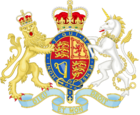Social:Church of England Marriage Measure 2008
 | |
| Citation | 2008, No. 1 |
|---|---|
| Territorial extent | England |
| Dates | |
| Royal assent | 28 May 2008 |
| Other legislation | |
| Amended by | Church of England Marriage (Amendment) Measure 2012 |
Status: Amended | |
| Text of the Church of England Marriage Measure 2008 as in force today (including any amendments) within the United Kingdom, from legislation.gov.uk. | |
The Church of England Marriage Measure 2008, No. 1 is a Church of England Measure passed by the General Synod of the Church of England extending the right to marry in a Church of England church to parish churches with which a person has a qualifying connection.
Effects
Previously, people had the right to be married in a Church of England parish church only if they were resident in the parish for six months or if they regularly worshipped there.[1] In order to marry in another church, the couple would have to obtain a special licence from the Archbishop of Canterbury, which was not automatically given.[2]
The Church of England Marriage Measure was introduced to extend the rights for people to marry in churches. The Measure allows a couple to be married in a church of their choice if one of them has a "qualifying connection" to it, such as being baptised or confirmed there. The Measure also grants them the right to marry in parishes in which their parents lived or regularly worshipped, or where their parents or grandparents had been married.[3] However, this right does not extend to cathedrals.[4]
Passage
The Measure was passed by the General Synod of the Church of England and passed through Parliament, receiving Royal Assent from the Supreme Governor of the Church of England, Queen Elizabeth II on 28 May 2008.[5] Despite concerns that it would lead to "wedding tourism",[4] within two years of its introduction, marriages in the Church of England rose by 4% as a result.[6] The approach of the Measure was mirrored in the Marriage (Wales) Act 2010, bringing the position of the disestablished Church in Wales in line with the Church of England.[7]
References
- ↑ "Couples get more choice as Church relaxes wedding venue rules". The Daily Telegraph. 30 September 2008. https://www.telegraph.co.uk/news/religion/3110964/Couples-get-more-choice-as-Church-relaxes-wedding-venue-rules.html. Retrieved 3 January 2017.
- ↑ Elizabeth Grice (17 April 2008). "Shere: A village at war with its vicar". The Daily Telegraph. https://www.telegraph.co.uk/news/features/3636301/Shere-A-village-at-war-with-its-vicar.html. Retrieved 3 January 2017.
- ↑ "Legal entitlements to marry in a church". Faculty Office. http://www.facultyoffice.org.uk/special-licences/general-information-about-marriage-law/legal-entitlements-to-marry-in-a-churchresidencechurch-electoral-roll-membership-and-qualifying-connections/. Retrieved 3 January 2017.
- ↑ 4.0 4.1 "More choice for church weddings". BBC News. 1 October 2008. http://news.bbc.co.uk/1/hi/uk/7643884.stm. Retrieved 3 January 2017.
- ↑ "Church of England Marriage Measure 2008". Legislation.gov.uk. 22 May 2008. http://www.legislation.gov.uk/ukcm/2008/1/introduction. Retrieved 3 January 2017.
- ↑ Beckford, Martin (20 January 2012). "Church of England weddings up by 4% in 2010". The Daily Telegraph. https://www.telegraph.co.uk/news/religion/9026093/Church-of-England-weddings-up-by-4-in-2010.html. Retrieved 3 January 2017.
- ↑ Roberts, Nicholas. The historical background to the Marriage (Wales) Act 2010. University of Reading. http://centaur.reading.ac.uk/21693/1/The%20historical%20background%20to%20the%20Marriage%20(Wales)%20Act%202010%20(Ecc%20LJ)%20(resub)(prf%20crrctd).pdf. Retrieved 3 January 2017.

